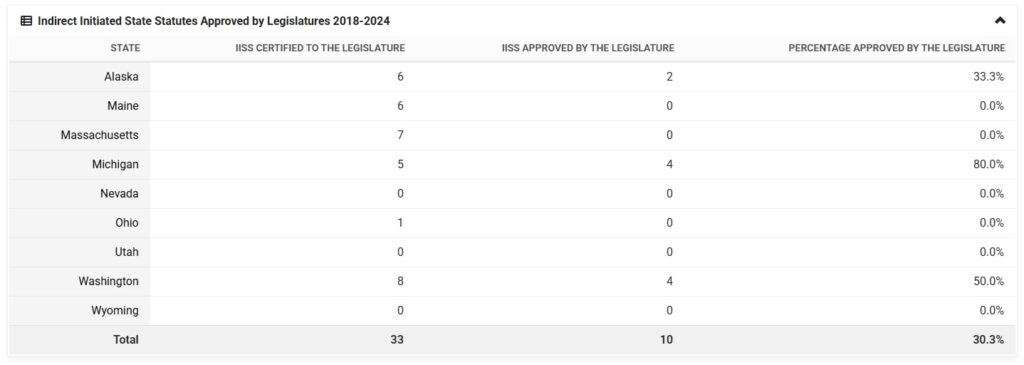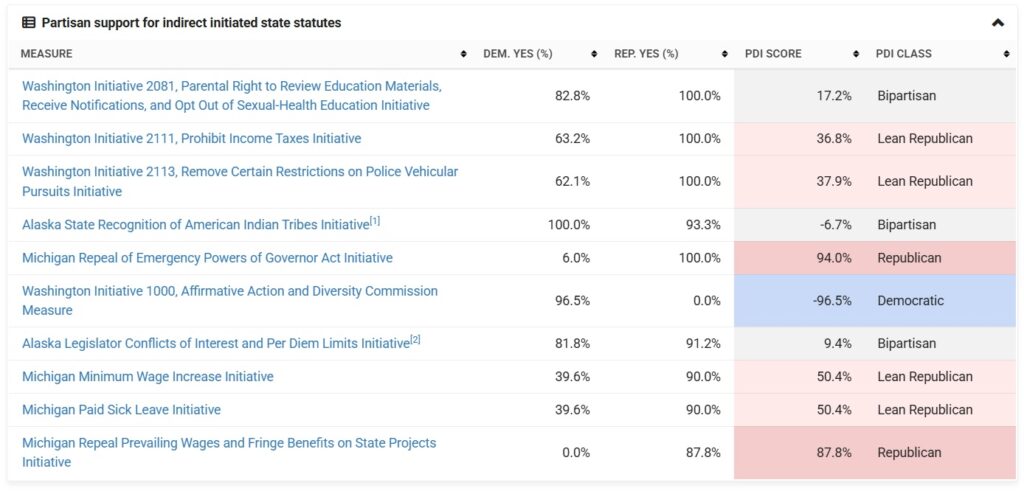Between 2018 and 2025, state legislatures approved 10 of the 33 indirect initiated state statutes (30.3%) that qualified for the ballot, with voters deciding the remaining 23.
An indirect initiated state statute is a citizen-initiated ballot measure that amends state statute. There are nine (9) states that allow citizens to initiate indirect state statutes. While a direct initiative is placed on the ballot once supporters file the required number of valid signatures, an indirect initiative is first presented to the state legislature. Legislators have a certain number of days, depending on the state, to adopt the initiative into law. Should legislators take no action or reject the initiative, the initiative is put on the ballot for voters to decide.
In 2025, voters will be deciding on two indirect initiated state statutes, both in Maine:
- the Extreme Risk Protection Orders to Restrict Firearms and Weapons Access Initiative
- the Require Voter Photo ID and Change Absentee Ballot and Dropbox Rules Initiative
Both measures were presented to the state legislature but were not approved, resulting in them appearing on the ballot in November.
Overview of indirect initiatives from 2018 to 2025
Of the nine states that provide for indirect initiated state statutes, legislatures in three states approved at least one measure from 2018 to 2025. Michigan and Washington approved the most indirect initiatives, with each state legislature approving four. The Alaska State Legislature approved two.
Michigan had the highest approval rate, with the legislature approving four out of five certified initiatives (80.0%). Washington saw the highest number of indirect initiatives submitted to the legislature—eight in total—with four approved (50.0%).
In Maine, Massachusetts, and Ohio, indirect initiated state statutes qualified for the ballot, but the state legislatures did not approve them; therefore, the measures appeared on the ballot.
The year that the most indirect initiatives were approved by state legislatures was 2018. That year, Michigan approved three initiatives and Alaska approved one. In Nevada, Utah, and Wyoming, no indirect initiated state statutes qualified for the ballot during this period.

Party support for approved indirect initiatives
Of the 10 indirect initiated state statutes that state legislatures approved between 2018 and 2025:
- Two (20%) were classified as Republican.
- Four (40%) were classified as Lean Republican.
- One (10%) was classified as Democratic.
- Three (30%) were classified as Bipartisan.
Partisanship is calculated by measuring the difference in support between Democratic and Republican legislators, then dividing that range into five equal categories. Additional information on this metric is available here.

Legislative alteration of indirect initiatives
Between 2018 and 2025, state legislatures amended four of the ten (40%) indirect initiatives after approving them.
- Two of the indirect initiatives were amended by the Michigan State Legislature in December 2018. On Sept. 5, 2018, the legislature approved both the Minimum Wage Increase Initiative and the Paid Sick Leave Initiative. On Dec. 13, the legislature passed Senate Bill 1171 (SB 1171) and Senate Bill 1175 (SB 1175), two bills that amended the initiatives. Gov. Rick Snyder (R) signed the bills. On July 31, 2024, the Michigan Supreme Court ruled in a 4-3 decision that legislators had violated the Michigan Constitution by adopting and then amending an initiative during the same session.
- On June 6, 2018, the Michigan State Legislature approved the Repeal Prevailing Wages and Fringe Benefits on State Projects Initiative. Gov. Gretchen Whitmer (D) signed House Bill 4007 on March 24, 2023, which reinstated the prevailing wage law and repealed the initiative.
- The Washington State Legislature approved Initiative 2081 on March 2, 2024. On May 20, 2025, Gov. Bob Ferguson (D) signed House Bill 1296 into law, which eliminated the rights of parents to receive prior notification when most medical services are offered to their child.
Indirect initiatives and the governor’s veto
In five of the nine states that allow for indirect initiated statutes, the governor can veto a legislatively approved indirect initiative. In four states — Alaska, Michigan, Washington, and Wyoming — the governor cannot veto an indirect initiative approved by the legislature. Between 2018 and 2025, legislatures approved two indirect initiatives in states where the governor lacked veto power, but the governor expressed opposition to the measures. Both were in Michigan.
- On June 6, 2018, the Michigan State Legislature approved the Repeal Prevailing Wages and Fringe Benefits on State Projects Initiative. Gov. Rick Snyder (R) had voiced his opposition to repealing the prevailing wage law.
- On July 21, 2021, the Michigan State Legislature approved the Repeal of Emergency Powers of Governor Act Initiative. Gov. Gretchen Whitmer (D) opposed the initiative.



